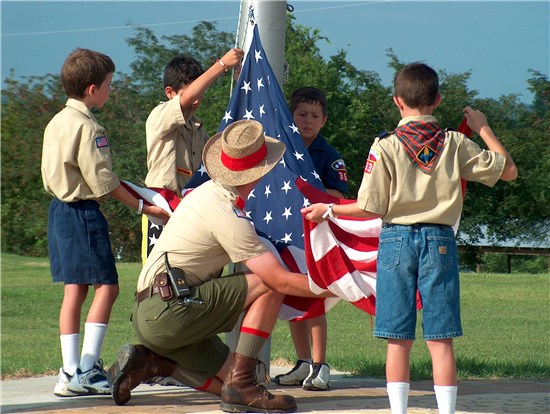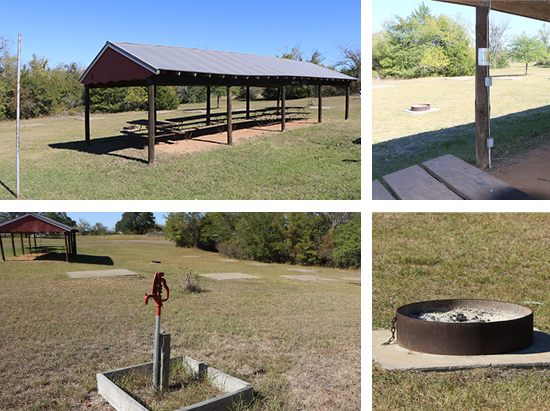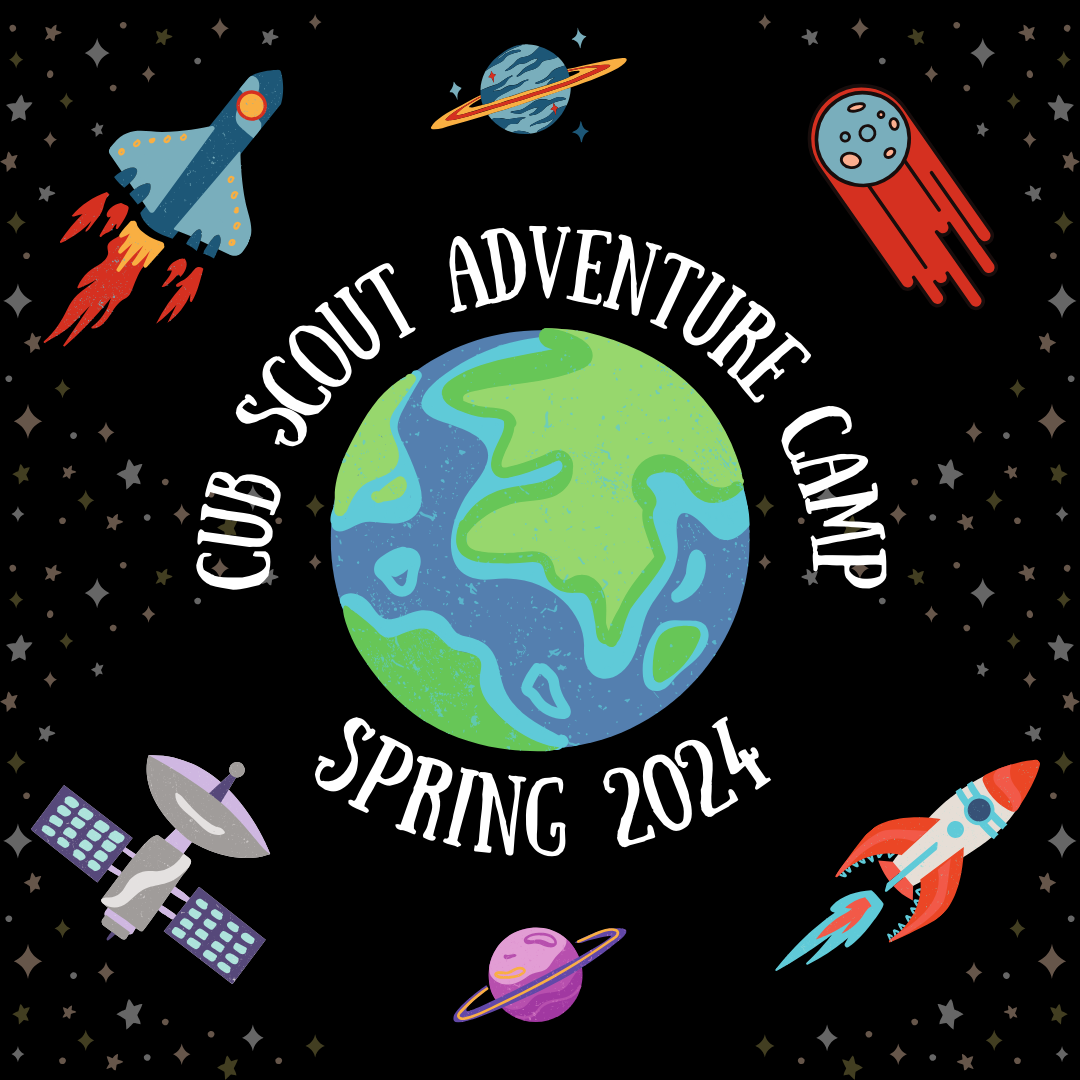Calling all space explorers! Pack your bags and prepare for liftoff on an epic adventure at Bovay Scout Ranch this spring. We're revving up our Space Exploration-themed camp based on NASA's Artemis program, packed with stellar activities to conquer the Out of This World's Stem Nova award and beyond! Learn more about our program updates.
Adventure Camp is weekend campout at Bovay Scout Ranch. Lions, Tigers, Wolves, Bears and Webelos Scouts and their families will enjoy an exciting variety of activities at several program areas. Meals are eaten in the air-conditioned dining hall. A camp staff team member in each area will provide program supplies and support the parents who will be invited to assist in leading the activities.
Enjoy all the wonder and beauty of the central Texas rolling hills and lakes at Bovay Scout Ranch.
Registration
 Registration should be completed by the pack leader or Webelos den leader (for Webelos den camping). Families that register individually will be combined with families from other packs. Registration is on a first-come, first-served basis; sessions fill up fast.
Registration should be completed by the pack leader or Webelos den leader (for Webelos den camping). Families that register individually will be combined with families from other packs. Registration is on a first-come, first-served basis; sessions fill up fast.
The registration fee is $50 per person and includes four meals (three on Saturday and breakfast on Sunday with vegetarian and turkey patty options), a patch, and the Scout’s program supplies. Children under five attend free of charge; please note that the program is designed for Scouts. A $100 non-refundable deposit for the group secures a spot. All fees must be submitted no later than thirty days prior to the camping date.
One adult per 15 Scouts in the pack may attend at no cost. This adult will be asked to volunteer to work as program staff and must attend the 8:00 am leader’s meeting. To ensure your camp reservation, registrations, including all fees, must be submitted thirty days prior.Adventure Camp Feedback
 Support desk (for questions not addressed on this page).
Support desk (for questions not addressed on this page).
What to Bring
- Copy of a current BSA Annual Health and Medical Record
(Part A & B for all Scouting events) for every participant
- Tent
- Sleeping bag, sheets or blanket
- Pillow
- Cot or air mattress
- Personal items (e.g., deodorant, comb, medications, toothpaste, toothbrush)
- Water bottle, canteen, or cup
- Scout uniform, determined by pack leadership
- Clothing appropriate for weather and extra clothes
- Closed-toed shoes (tennis shoes) and extra pair
- Pajamas or sleeping clothes
- Rain gear
- Flashlight and extra batteries
- Personal medications
- Swimsuit and towel (weather permitting)
- Towel and washcloth
- Sunscreen
- Pocket knife and Whittlin' Chip (3rd-5th graders)
- Personal first aid kit
- Day pack
- Hand sanitizer
|
Optional:
- Money for patches, snacks and beverages, and t-shirts at the camp trading post, Trader Vics.
- Alarm clock
- Battery operated lantern
- Bicycle and bike helmet
- Book of Faith
- Camera
- Camp chair
- Cub Scout Handbook
- Fishing gear
- Glow sticks (great to keep track of your kids at night and to play games)
- Lockable footlocker
- Shower shoes
- Snacks (do not keep in the tent)
- Sports drinks or flavor packets for water (to help keep Scouts hydrated)
- Sunglasses
- Insect repellent
- Phone battery backup charger
- Wagon
|
Pack:
- Friday night snack, optional
- First-aid kit
- Camper Release Form for Scouts whose parents are not attending camp
Paperwork:
- Camp roster (emailed the Tuesday before camp - see instructions below)
- Copy of medical forms, two copies alphabetized in an envelope or notebook (one to keep in campsite and one to turn in during registration)
|
 Campsite Amenities
Campsite Amenities
Mark all items with name and pack number. *Electricity is very limited.
About the Campsites. Campsites have a water spigot with potable drinking water, a covered pavilion with lights, one power plug, picnic tables, a flag pole, and a campfire ring. Campers can park in the parking lot next to the campsite. Shower houses are located between campsites with individual stalls that are ADA-compliant and have a toilet, shower, and sink.
What NOT to bring to camp: alcohol, valuables, electronics, firearms, guns/ammunition, illegal drugs, liquid fuel lanterns or stoves, pets, scooters, skates, skateboards
|
Program Updates

Out of This World STEM Nova Weekends Program
(Wolf, Bear, Webelos and Arrow of Light Scouts will complete the Out of This World STEM award; packs will need to purchase the awards)
- Archery
- BB
- Eclipses
- Paper Airplanes & Balloon Powered boats
- Destination Mars! Build a base on Mars
- Planet Navigation (orienteering course, scavenger hunt)
- Movie Night
- Campfire Program with Stem Nova Counselor
- Stargazing with Brazos Bend Astronomy Club on March 22 and April 6, 2024
Space Explorer Academy Weekend Program
- Archery
- BB
- Space Academy Training: Space Glove activity & Control a robotic arm
- STEM Challenge: Crew Module Safety Check & Transfer the Rocket to the Launchpad
- Make Finger Rockets
- Space Games (active group games)
- Movie Night
- Campfire Program with Stem Nova Counselor
- Stargazing with Brazos Bend Astronomy Club on February 23, March 2, and April 20, 2024
Tentative Schedule*
Friday
|
| 4:00 pm |
Camp opens.
Get specific campsite assignments when arriving at the check-in building, the first building past the entrance gate. |
Check-in Building
|
| 4:00 - 9;00 pm |
Campers proceed to assigned campsite and set up (eat dinner before arriving) |
Campsites |
| 6:00 - 7:00 pm |
One representative from each pack (or group registration) checks-in (submits paperwork and picks up rotation schedule) |
Headquarters Building |
| TBD |
Movie on the lawn and snack |
TBD |
| 8:30 pm |
Leader's meeting |
Headquarters Breezeway |
Saturday
|
| 7:30 - 9:00 am |
Late check-in at administration building |
Headquarters Building |
| 8:00 am |
Breakfast |
Dining Hall |
| 9:00 - 11:00 am |
Program activities |
Program Areas |
| 11:00 am |
Lunch |
Dining Hall |
| 1:00 - 4:00 pm |
Program activities |
Program Areas |
| 5:00 pm |
Dinner |
Dining Hall |
| 7:00 pm |
Free time with pack |
Campsites |
Sunday
|
| 8:00 am |
Breakfast |
Dining Hall |
| 9:00 am |
Check-out |
Headquarters Building |
| 11:00 am |
Camp closed |
|
*The final schedule will be provided during the leader's meeting on Friday night. Schedules vary based on camp attendance.
Leadership Requirements
Each registered unit must provide a minimum of two-deep leadership. “Two registered adult leaders 21 years of age or over are required at all Scouting activities, including all meetings. There must be a registered female adult leader 21 years of age or over in every unit serving females. A registered female adult leader 21 years of age or over must be present for any activity involving female youth or female adult program participants. Notwithstanding the minimum leader requirements, age and program-appropriate supervision must always be provided." (Source, Youth Protection and Barriers to Abuse FAQs). Each unit should have one BALOO-trained leader and one safe swim defense-trained leader. (Camp has waterfronts).
Adults:
Adults spending the night at camp must be either:
- Cub Scout parents or legal guardians taking part in an overnight Cub Scout program with their own child or legal ward are not required to register as leaders. All adults must review the “How to Protect your Children from Child Abuse: A Parent’s Guide” that can be found in the front of each Cub Scout Handbook. In addition, the parent or legal guardian must be accompanied by a registered leader at any time they are with youth members other than their own child/ward. (Source)
- Currently registered in an adult fee-required position in the position(s) they serve. See FAQ for list of approved adult registration fee-required positions. (Source)
Tenting: • Separate tenting arrangements must be provided for male and female adults as well as for male and female youth. • Youth sharing tents must be no more than two years apart in age. • In Cub Scouting, parents and guardians may share a tent with their family. • Spouses may share tents. (Source)
The most recent updates to BSA's Guide to Safe Scouting policies must be followed and all Scouting activities be conducted in a safe and prudent manner including using the Age-Appropriate Guidelines for Scouting Activities.
Roster
The unit leader will need to email a roster to the camp director the Tuesday before camp. The roster includes the names of everyone attending. For the ranks of the Cub Scouts and registrant types, use the number one (1) in the columns to auto-calculate the totals. In the Meals column, note any dietary requests using V for vegetarian, GF for gluten-free, and NP for no pork).
Camp Roster
Arrival and Check-in
Campers may arrive beginning at 4:00 pm on Friday. Upon arrival, all campers will stop at the check-in building inside the main gate and be provided a parking pass and campsite assignment. Campers can go to their campsite and set up camp. Upon arrival at the campsite, please inspect the campsite to ensure there are no safety issues or prior damages. If there are any issues, report them to the staff immediately. All campsites have a pavilion with multiple picnic tables and a red fire water bucket.
All persons on site will be provided a wristband and must always wear their designated wristbands. Wristband colors determine which rotation schedule that is to be followed. The rotation schedule is designed for a specific number of youth at each outpost.
One representative from each pack or group must check in between 6:00 - 7:00 pm at the Headquarters Building (approximately one mile past the main gate on the left) and register the unit or group. To facilitate a quicker registration process, please be sure to have all of the medical forms.
Medical Forms
All Adventure Camp participants must have a completed BSA Annual Health and Medical Record (Part A, B1, B2 for all Scouting events) .
Bring two copies alphabetized in an envelope or notebook (one to keep in campsite and one to turn in during registration).
The following are the most common errors or omissions made on the BSA Annual Health and Medical Record submitted:
Leader's Meeting
There is a mandatory leader's meeting at 8:30 pm in the Safari Room located in the Administration Building.
Departure Procedures
Departure is after breakfast on Sunday between 9:00 am - 11:00 am. The camp quartermaster will drop off cleaning supplies at the restrooms on Sunday morning. Follow the written instructions for cleaning assigned showers and restrooms. Scouts should conduct a police line where Scouts stand within arm’s length of each other and walk the entire campsite picking up all trash. The camp quartermaster and camp staff will inspect each campsite to make sure the campsite, restrooms, showers, and pavilions are undamaged and clean, and that all gear and trash is removed. The trash is to be taken and dropped off at the dumpsters near the front of the camp on the way out. Dumpster at the dining hall is for kitchen use only. After passing inspection, the designated leader should proceed to the administration building to sign out and pick up paperwork.